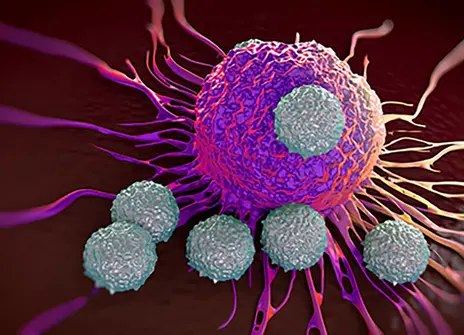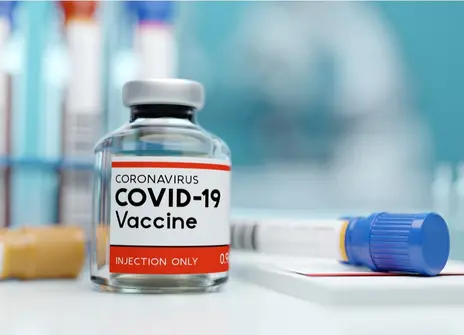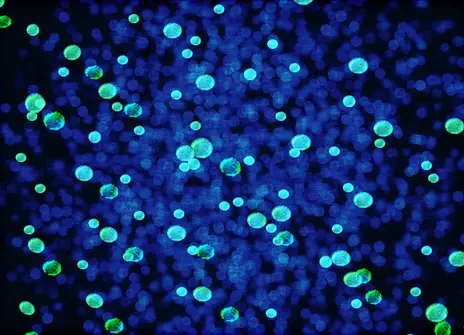PhD students looking to expand their science communication experience can embark on three-month internships at the Ri throughout the year. Our new event series 'Science and Snacks' allows you to hear from past and present PhD interns and learn about their work outside the Ri and in the lab!
We spoke to Maya Pidoux, Hannah Cooke, and James Kavanagh, whose Science and Snacks events are coming up in April, to give a sneak peak into their PhD and experiences as an Ri intern.
We bring the science, you bring the snacks.
Maya Pidoux
When did you realise you wanted to pursue a PhD?
I have always loved learning about science and how our body works. However, I didn’t realise I wanted to do research until I spent a year working at AstraZeneca where I got very excited while thinking of new ways to address questions and coming up with experiments to answer questions. I wanted to do more of this which is why I decided to pursue research further.
What is your PhD about? (Without giving too much away before your Science and Snacks talk!)
My PhD research focusses on killer T cells (a type of immune cell) that help fight the influenza virus. I am researching how these killer T cells change as people age and if these changes could help explain why older people are more likely to get seriously ill from influenza virus infection.
Whilst studying your PhD, you decided to take a break to join the Ri for an internship. Why do you think it is important to develop communication skills as a researcher?
Being able to explain complicated topics in a simple and understandable way can greatly increase your understanding of the topic and allow you to get to the root of the concept. Explaining your own research to the public can lead to really interesting conversations. In fact, some of the most thought-provoking questions I have had about my research have come from children and members of the public because they are coming at it from a completely different angle.
Additionally, as a lot of research is publicly funded, I think it is very important for scientists to communicate effectively with the public so that people have access to and can learn about current research that they are funding.
What was your favourite memory from your time here at the Ri?
During my time at the Ri I have been working in the L'Oréal Young Scientist Centre and helping to deliver science workshops to school groups. One of my favourite memories here was the first time I delivered a Cosmetic Chemistry workshop to Year 5 students. It was amazing to see how excited they were to make bath bombs and learn all about the science behind them.
Finally, if you could give one piece of advice to someone considering research/pursuing a PhD, what would it be?
For me, the most important thing is that you are researching something that really interests and excites you! Research can be a slow-moving process but if you are researching something you are interested in it is easy to stay motivated while you are working.
Hannah Cooke
When did you realise you wanted to pursue a PhD?
I knew I wanted to become a researcher while at university. I began to understand how science and research affects every part of our lives, from our medicines, to our environment, and even our food. Being a part of that research, and to potentially help people with it, felt really exciting.
What is your PhD about? (Without giving too much away before your Science and Snacks talk!)
My PhD is all about developing new vaccine delivery systems, which are like containers that you package a vaccine inside. These delivery systems are designed to protect and deliver the vaccines to where they need to be in the body. Without them, many vaccines wouldn’t work!
Whilst studying your PhD, you decided to take a break to join the Ri for an internship. Why do you think it is important to develop communication skills as a researcher?
I think it’s really important for scientists to communicate their research to a non-specialist audience so they can understand the impact and influence of their work. So, learning how to communicate your research in an informative and engaging way is a really crucial skill for a researcher. I gained some great experience in this at the Ri.
What was your favourite memory from your time here at the Ri?
Being on the telly, obviously! (But really, presenting the Ri's first show of the year with the demo team was definitely a highlight of my time there).
Finally, if you could give one piece of advice to someone considering research/pursuing a PhD, what would it be?
Research isn’t about being the smartest in the room! It’s about being a good problem solver, a critical thinker, and a team player. If you have those skills, you’re already on your way to being a successful researcher!
James Kavanagh
When did you realise you wanted to pursue a PhD?
I’m not sure I do know that I want to be a researcher! Becoming a researcher is a long and strange journey with lots of doubt and uncertainty along the way but it’s also a lovely journey, with many fun and valuable moments along the way.
It's nice that you can come out the other end and still not be sure that its what you want to do but know that the journey wasn’t a waste of time.
The two people who put me on my path into science were my two A-level biology teachers. They really instilled a curiosity about the subject far beyond what we needed for the exams. It was their push to find what we were curious about to spark our interest in it that first got me into the idea of becoming a researcher.
What is your PhD about? (Without giving too much away before your Science and Snacks talk!)
My PhD is all about the microbes that live inside our body and help us in our daily lives. Our bodies are teeming with living cells and we are only just scratching the surface in understanding what they do and how studying them can help us improve our understanding of our own bodies. I’m particularly interested in how these microbes influences how our bodies respond to viruses.
Whilst studying your PhD, you decided to take a break to join the Ri for an internship. Why do you think it is important to develop communication skills as a researcher?
Many scientists underestimate just how important science communication is! There is a misconception that taking time to properly articulate your ideas is time away from your research. To me, if you can’t properly communicate your research to people then it's a waste doing it at all!
What was your favourite memory from your time here at the Ri?
I think my personal favourite memory was filming all the behind the scenes footage for the CHRISTMAS LECTURES. There was such a fun and excitable atmosphere in the building. It was so much fun to be able to document that and to highlight the incredible amount of work that is done backstage to bring everything together. The demo team and everyone backstage put in an incredible amount of work and it really shows.
Finally, if you could give one piece of advice to someone considering research/pursuing a PhD, what would it be?
My one piece of advice would be find yourself a research group where you feel valued and encouraged. Having the right working environment can make all the difference, especially if you are there for 3-4 years.



